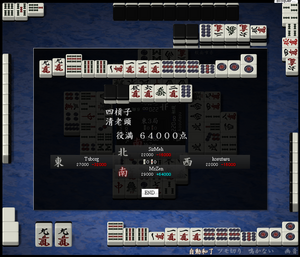Multiple yakuman: Difference between revisions
m (→Scoring) |
|||
| Line 7: | Line 7: | ||
==Scoring== | ==Scoring== | ||
Application of the multiple yakuman may vary, as some rules do not allow multiple yakuman in terms of [[scoring]]. In this case, even if the hand is composed of multiple yakuman, the score payout may be capped. | |||
'''Yakuman as maximum score:''' Many professional organizations in Japan limit all payouts to a single yakuman, that being 32,000 points to a nondealer or 48,000 points to the dealer. Riichi deposits and repeats are added as usual. [http://www.youtube.com/watch?v=gXYWs5XGmlA] | '''Yakuman as maximum score:''' Many professional organizations in Japan limit all payouts to a single yakuman, that being 32,000 points to a nondealer or 48,000 points to the dealer. Riichi deposits and repeats are added as usual. [http://www.youtube.com/watch?v=gXYWs5XGmlA] | ||
| Line 16: | Line 16: | ||
===EMA=== | ===EMA=== | ||
The [[European Mahjong Association]] (EMA) has decided to apply a made-in-Europe variant of this rule | The [[European Mahjong Association]] (EMA) has decided to apply a made-in-Europe variant of this rule, which specify particular yakuman as double. For example, [[daisuushi]] hands count as double yakuman per the 2012 RCR rules. | ||
==Examples== | ==Examples== | ||
Revision as of 22:15, 10 October 2013

Multiple yakuman involve hands with more than one yakuman, as the name implies. While regular yaku may be stacked in one hand to raise value, the same can be done with different yakuman, where applicable.
In terms of scoring, the number of yakuman in the hand serves as a multiplier to the base yakuman point value. As a result, extremely high scoring hands are made possible.
If, in addition to one or more regular yakuman, the hand would also be a kazoe yakuman, no extra yakuman is added for this. For regular yakuman, han from normal yaku and dora are not counted.
Scoring
Application of the multiple yakuman may vary, as some rules do not allow multiple yakuman in terms of scoring. In this case, even if the hand is composed of multiple yakuman, the score payout may be capped.
Yakuman as maximum score: Many professional organizations in Japan limit all payouts to a single yakuman, that being 32,000 points to a nondealer or 48,000 points to the dealer. Riichi deposits and repeats are added as usual. [2]
Single yakuman score per accumulated yakuman: On Tenhou.net, suuankou tanki, daisuushi, and the multiple wait versions of kokushi musou and chuuren poutou are all counted as scoring 1 yakuman. Cumulative yakuman, such as the examples below, are counted as 2 or more yakuman.
Full scoring: The common rules normally recognize that all yakuman are cumulative (except kazoe yakuman), and that the harder yakuman are worth double when counting.
EMA
The European Mahjong Association (EMA) has decided to apply a made-in-Europe variant of this rule, which specify particular yakuman as double. For example, daisuushi hands count as double yakuman per the 2012 RCR rules.
Examples
* Maximum score cap: 1 yakuman. (Note: 2 in the EMA) * Cumulative single cap: 1 yakuman. * Full scoring: 2 yakuman.
* Maximum score cap: 1 yakuman. * Cumulative single cap: 2 yakuman. * Full scoring: 2 yakuman.
* Maximum score cap: 1 yakuman. * Cumulative single cap: 2 yakuman. * Full scoring: 2 yakuman. Note: Winning this hand by ron will only be worth a single daisangen hand.
* Maximum score cap: 1 yakuman. * Cumulative single cap: 3 yakuman. * Full scoring: 4 yakuman.
External links
| |||||||||||||||||||||||||||||||
